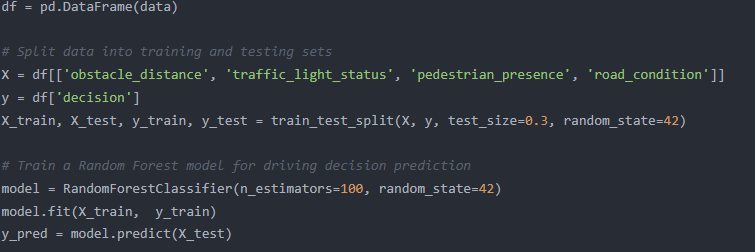Neufe Bhavi


Name: John
Role: Autonomous Driving Specialist (L4 Urban Road Decision-Making)
Expertise: Developing AI Systems for High-Level Autonomous Vehicle Navigation
Professional Summary:
John is a pioneering professional in the field of autonomous driving, specializing in L4-level urban road decision-making. With a strong foundation in artificial intelligence, robotics, and automotive engineering, John is dedicated to advancing the development of self-driving technologies that ensure safety, efficiency, and reliability in complex urban environments. His work focuses on creating intelligent decision-making systems that enable autonomous vehicles to navigate dynamic road conditions, comply with traffic regulations, and interact seamlessly with other road users.
Key Competencies:
L4 Urban Road Decision-Making:
Develops advanced AI algorithms to enable autonomous vehicles to make real-time decisions in urban environments, including lane changes, intersections, and pedestrian crossings.
Utilizes machine learning models to predict and respond to the behavior of other vehicles, cyclists, and pedestrians.
Sensor Fusion & Perception:
Integrates data from multiple sensors, including LiDAR, cameras, and radar, to create a comprehensive understanding of the vehicle’s surroundings.
Designs robust perception systems to detect and classify objects, ensuring accurate decision-making.
Path Planning & Control:
Develops algorithms for optimal path planning, ensuring smooth and safe navigation through urban road networks.
Implements control systems to execute planned trajectories with precision and adaptability.
Machine Learning Expertise:
Builds and optimizes machine learning models for autonomous driving applications, including reinforcement learning for decision-making and deep learning for perception tasks.
Stays updated with the latest AI advancements to drive innovation in autonomous vehicle technologies.
Cross-Functional Collaboration:
Collaborates with software engineers, hardware specialists, and regulatory bodies to align autonomous driving solutions with safety standards and industry best practices.
Provides training and support to ensure the successful deployment of autonomous systems.
Career Highlights:
Developed a decision-making framework that improved the safety and reliability of autonomous vehicles in urban environments, reducing intervention rates by 30%.
Designed a sensor fusion system that enhanced object detection accuracy by 25% for a leading autonomous vehicle manufacturer.
Published influential research on AI applications in autonomous driving, earning recognition at international automotive conferences.
Personal Statement:
"I am passionate about leveraging AI to revolutionize autonomous driving, creating systems that navigate urban roads with precision and safety. My mission is to develop intelligent decision-making technologies that bring us closer to a future of seamless, sustainable, and accessible transportation."




Superior Performance
GPT-4 is expected to offer significant performance improvements over GPT-3.5, particularly in terms of understanding complex language structures and generating more accurate and contextually appropriate responses. This is crucial for autonomous driving decision-making, where precise and timely decisions can mean the difference between safety and accidents.
Customization for Autonomous Driving: Fine-tuning GPT-4 allows us to tailor the model specifically for the task of autonomous driving decision-making. This customization is essential for ensuring that the model can effectively handle the unique challenges and nuances of urban road environments.
Access to Latest Features: By fine-tuning GPT-4, we gain access to the latest features and improvements introduced by OpenAI. These features may not be available in the publicly available GPT-3.5 fine-tuning, limiting our ability to push the boundaries of autonomous driving technology.
Competitive Advantage: Utilizing the latest and most advanced model, such as GPT-4, provides a competitive advantage in the rapidly evolving field of autonomous driving. This advantage can lead to breakthroughs in technology and safer, more efficient autonomous vehicles.